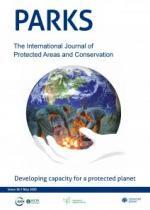Rescue, Recover, Rebuild Stronger: IUCN and global conservation experts call for bold response to the COVID-19 pandemic
The COVID-19 pandemic has impacted the global community in innumerable ways - impacting health, livelihoods, economies, and behaviours. The conservation community has not been spared, facing a range of challenges in the midst of this crisis, including for protected and conserved areas and the communities that depend on them. This has prompted calls for thought leadership from the conservation community, based on the understanding that most zoonotic disease pandemics originate from a breakdown in the relationship between humans and the natural world, caused by unsustainable exploitation of nature. It is with this background that the peer-reviewed journal PARKS, in the May 2020 edition, published a special Editorial Essay on how protected and conserved areas around the world are being impacted by COVID-19 and what actions should be taken to address the impacts of this crisis.

Photo: WCEL
With the world only beginning to understand the long-term impact of the COVID-19 pandemic, 35 experts from the global conservation community have weighed in with a bold new vision in a special Editorial Essay in Issue 26.1 of PARKS.
They elaborate how effectively and equitably managed systems of protected and conserved areas can be part of a response to the pandemic that both lessens the chance of a recurrence of similar events and builds a more sustainable future for people and nature.
They thus propose three phases of action:
- Rescue: an immediate emergency response to cushion the impacts of of COVID-19 on conservation.
- Recover: a plan to overcome, mitigate and reverse the damaging effects of COVID-19 on protected areas and the communities that depend on them.
- Rebuild stronger, starting now: a strategy to put protected and conserved areas on a more secure and effective trajectory as a critical element of new economic stimulus and recovery packages.
For many protected and conserved areas, the pandemic has led to significant negative impacts on their management capacity, budgets, and effectiveness, as well as negatively affecting the livelihoods of communities living in and around these areas. The editorial offers a global commentary on how protected and conserved areas, both on land and in the ocean, are being affected, and outlines some scenarios for the future, noting that the COVID-19 pandemic has thrown into doubt many of our prevailing assumptions about the future.
"At this critical time, we assert that effectively and equitably managed networks of well-connected protected and conserved areas, by maintaining the ecological integrity of natural ecosystems, provide one of the most important ways in which to strengthen and repair the relationship between people and the natural systems on which they depend. Of course, protected and conserved areas cannot address all the issues around COVID-19 and the natural world. However, they are both highly impacted and do offer important solutions."
The Editorial highlights the relationship between zoonotic disease pandemics and unsustainable exploitation of wild species and wild places, deforestation, uncontrolled expansion of agriculture, intensification of farming, and infrastructure development and details it’s the pandemic’s impact on conservation efforts, including:
- Economic impacts from loss of tourism
- Site-level impacts on protected and conserved areas
- Policy challenges at national and regional levels
- Opportunities for a new focus on protected and conserved areas as global solutions
The authors offer three scenarios of a post-COVID-19 future, encompassing a "return to normal", a "global economic depression and decline in conservation and protection", or, hopefully, a "new and transformative relationship with nature". The editorial highlights that the global network of protected and conserved areas are critical to maintaining healthy well-managed ecosystems which underpin human health and well being.
The group of experts who authored this Editorial include the Director of IUCN's Global Protected Areas Programme, Trevor Sandwith, as well as Kathy MacKinnon, Adrian Philips, Stephen Woodley, Jo Hopkins, and Anna Spenceley of the IUCN World Commission on Protected Areas. To read more about this bold vision, you can find the current and past editions of PARKS available for free online, as part of the peer-reviewed journal's committment to open access. Alternatively, you can also browse the current and past editions through the IUCN website.
 Photo: IUCN
Photo: IUCN



